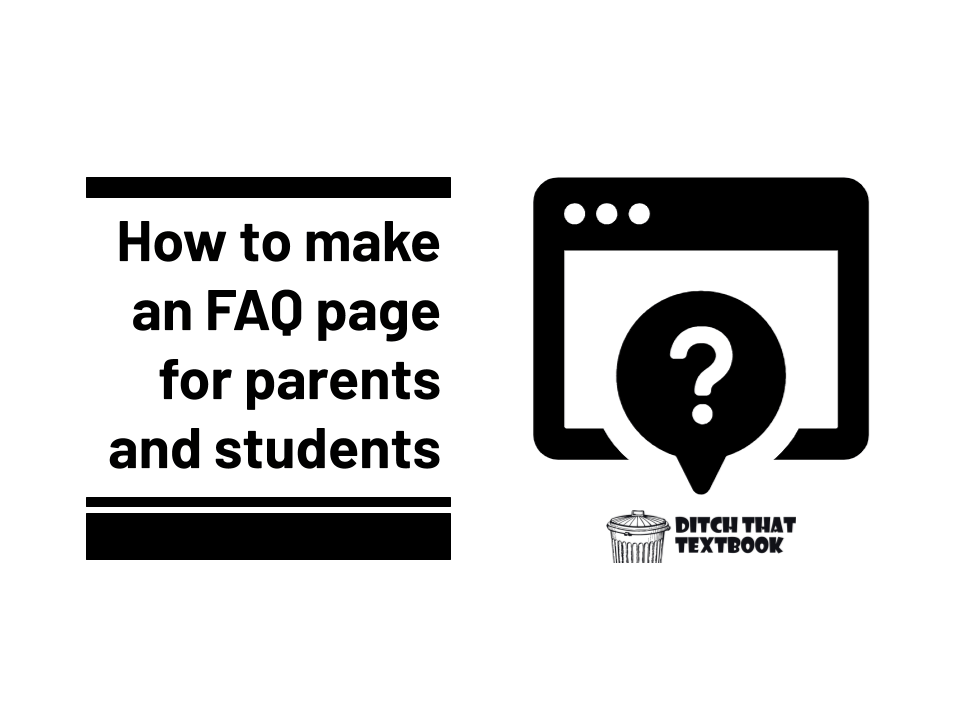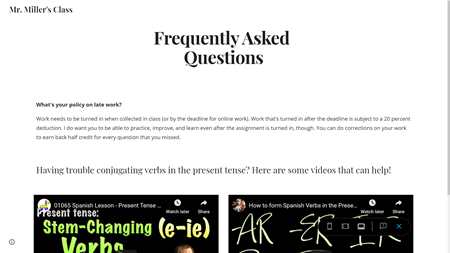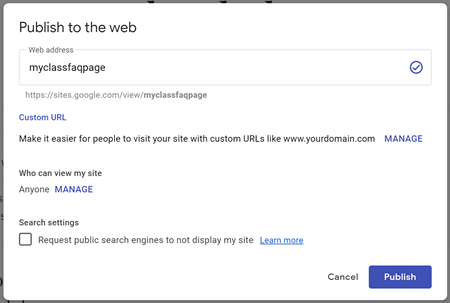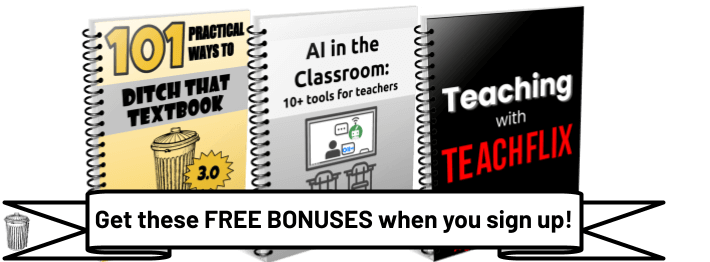
An FAQ (frequently asked questions) can save us time and provide resources for parents and students. Here's how to make one.
As educators we field a LOT of questions -- from students and from parents.
- When is that permission slip due again?
- Can I turn that assignment in late?
- What does the atomic number mean in the periodic table of elements?
Answering the same questions over and over again can be exhausting -- especially when the questions make your inbox feel like a never-ending pile of emails.
With a little time up front, you can make those questions feel a little less exhausting -- and provide a 24/7 resource that can serve your students and their parents.

Here's what a simple frequently asked questions (FAQ) page could look like in Google Sites.
An FAQ page (frequently asked questions) is a common part of many websites. In it, the website creator anticipates questions that the public will ask -- or gathers questions they have actually asked. Then, the creator puts those questions on a page with answers to them. It's a living, breathing document where you can add more questions and answers as they arise.
When students or parents ask a question, point them to the FAQ if the question has already been asked and answered. This can save you a ton of time and headaches.
Plus, when they learn that the FAQ is there, they might find the answer there without asking you at all -- the best solution for everyone!
Planning an FAQ page
There are several ways to set up an FAQ page:
- A simple online document (like Google Docs or Microsoft Word Online)
- A simple website (like Google Sites or Microsoft Sway)
- A page on your learning management system (like Canvas, Schoology, Microsoft Teams)
As we tell students about writing, audience is key. You might want to make different FAQ's for different purposes.

A general student FAQ page is helpful to answer questions about student work, about grading, about policies, etc. This can be created in places where students can access it. This includes your learning management system (LMS) or a class website.

A unit-, chapter-, or activity-based student FAQ page can answer questions specific to that unit, chapter, or activity. These are helpful for units, chapters, or activities that are unique that might elicit unique questions. (Anything that's the same every unit, chapter, or activity could be in a general student FAQ page.)

A parent FAQ page is geared toward questions that parents might have. Some of these questions might cross over from a student FAQ page. It's important to put a parent FAQ page somewhere that parents have access like a document where anyone with the link can view or a website. Putting them in the learning management system where parents don't have log-in credentials means parents would have to log themselves in as their children, a practice with lots of potential problems.
What can I put in a FAQ page?
There's a LOT you can add to these pages. Thankfully, not everything here is content you have to create, either.

Anticipated questions. These are the questions you think students and/or parents would ask. This comes from your previous teaching experience or simply from looking at the class/unit/chapter/activity through the eyes of a parent or student. You can even ask a few parents and students to preview to see what questions they might have.

Asked questions. These are questions that you actually get asked. If you think others might have these questions too, you can add them to your FAQ.

Existing helpful videos. These are videos that already exist online (YouTube, Khan Academy, etc.) that explain and clarify something in a way that you approve. You can link to them from your FAQ with a simple text link. You can also embed those videos to be played right on your FAQ if you're using something that permits embedded videos (like a website or your LMS).

Head and shoulders videos. These are videos you shoot where you look straight at the camera and answer a question. Sometimes, hearing it explained by a teacher in his/her own words is helpful. For some people, responding with a quick video is easier than sitting down to type an answer. Some of my favorite ways to do this are the Shorts camera in Flipgrid (flipgrid.com) and the webcam only video in Screencastify (screencastify.com). Both can be shared through a link or by embedding the video. (Here are instructions for embedding a Google Drive video.)

Screencast tutorials. These videos record what's happening on your screen. Screencast tutorials are great for showing how to do something on a computer or presenting a video of slides with narration. I like Flipgrid and Screencastify for these, too. If you have a Windows laptop, try pressing the Windows key + G to open Game Bar. This app can record your screen, too.

Screenshots. Taking a simple screenshot and adding it to your FAQ can be a quick and easy way to communicate an idea. This site shows how to take a screenshot on virtually any device. Another option is to use the Aweesome Screenshot extension for the Google Chrome web browser. This extension lets you capture images and annotate them, adding text and drawing and other options. The free plan is limited but you can do a lot with it.

Infographics. These can communicate a lot with just visuals and text -- no video necessary. You can use screenshots and create step by step tutorial infographics. Or you can add text and visuals (like icons) to create infographics. My favorite tool to make these is Google Drawings. Here's a post on how to create infographics.
How to create an FAQ page with Google Docs or Microsoft Word Online
This is probably the easiest method. It limits what you can do with design and the types of items you can place on it. But if you're just looking to create an FAQ with text and maybe some images, it doesn't get easier than this.
- Create a new document.
- Add text, images, links, etc. to it.
- Click the "Share" button. Choose the level of access you want to provide (i.e. "anyone with the link can view").
- Copy the link.
- Share it with students, parents, etc.
You might even consider bookmarking the link to your FAQ page(s) to keep those links handy in case you need to share them.
How to create an FAQ page with Google Sites
This option gives you more design flexibility than a simple document. In it, you can embed videos and have greater design flexibility. Google Sites also lets you add docs, slides, and other files from your Drive. When you update them in Drive, they update automatically on your site.
- Create a new site. (An easy way: Go to sites.new)
- Design the site the way you want it. You can add a separate page for an FAQ page or make the entire site dedicated to an FAQ.
- When you're done designing, click "Publish". Give it a unique URL. You can customize who can access the site and whether search engines display it.
- Copy the link and share it with students, parents, etc.

Choose a unique URL and customize who can view your website before publishing on Google Sites.
What could you add to a FAQ page? How could this be helpful to parents and students? Share your ideas in a comment below!
For notifications of new Ditch That Textbook content and helpful links:
Are you looking for quality, meaningful professional learning that both equips and inspires teachers?
Matt provides in-person and virtual keynotes, workshops and breakout sessions that equip, inspire and encourage teachers to create change in their classrooms. Teachers leave with loads of resources. They participate. They laugh. They see tech use and teaching in a new light. Click the link below to contact us and learn how you can bring Matt to your school or district!
Is Matt presenting near you soon? Check out his upcoming live events!



THIS IS AN AWESOME IDEA!! Creating my FAQ’s in pages on Canvas today!! This will help with time management so much!! THANKS!!
Will be placing one on the course Moodle. Great idea!
LOVE THIS IDEA!!!
How best would you implement a FAQ page if you only use Google Classroom? Also, how would you have kids asks questions, if you only use G/C?